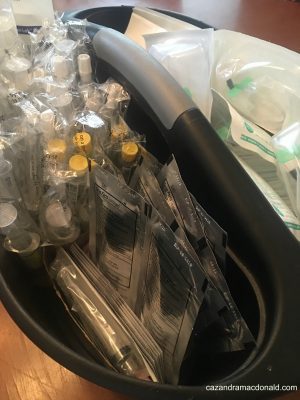Saturday, December 22, 2018
One-word Resolutions for the New Year
Posted by Cazandra Campos-MacDonald at 2:27 PM 0 comments
Thursday, November 29, 2018
PTSD Will Not Define Us
Posted by Cazandra Campos-MacDonald at 7:32 PM 0 comments
Sunday, October 28, 2018
Invisibility, Not the Easy Way
Posted by Cazandra Campos-MacDonald at 6:51 PM 0 comments
Chronic Illness and Depression Often Go Hand in Hand
Posted by Cazandra Campos-MacDonald at 6:43 PM 0 comments
Lessons Learned, the Hard Way
Posted by Cazandra Campos-MacDonald at 6:41 PM 0 comments
Monday, August 27, 2018
What Is a 504 Plan and Why Do I Need It?
Posted by Cazandra Campos-MacDonald at 8:48 PM 0 comments
Monday, June 11, 2018
Showing Appriciation for the People Behind the Scenes
Posted by Cazandra Campos-MacDonald at 6:37 PM 0 comments
Sunday, May 6, 2018
Moving is Complicated: Here Are A Few Tips To Help You Plan
Posted by Cazandra Campos-MacDonald at 6:31 PM 0 comments
Saturday, April 7, 2018
The Last Bucket

Posted by Cazandra Campos-MacDonald at 5:11 PM 0 comments
Tuesday, March 6, 2018
The Hemo Mama Bear Olympics
Posted by Cazandra Campos-MacDonald at 3:34 PM 0 comments
Sunday, February 18, 2018
With the Second Diagnosis Came Depression
Second in a series.
I have been on medication for my clinical depression for over 25 years. There is no other option. Even throughout my second pregnancy, I took medication under my psychiatrist’s supervision. I’ve never been ashamed to admit my need for medication, but one thing that has still been difficult for me after 12 years is understanding the postpartum depression I experienced after the birth of my second child.
To read the rest of this post, click here.
Posted by Cazandra Campos-MacDonald at 7:07 PM 0 comments
Sunday, February 11, 2018
With the Second Diagnosis Came Depression
Posted by Cazandra Campos-MacDonald at 8:07 PM 0 comments
Tuesday, January 23, 2018
Tips for Managing Your Bleeding Disorder in the New Year
Posted by Cazandra Campos-MacDonald at 7:41 PM 0 comments







